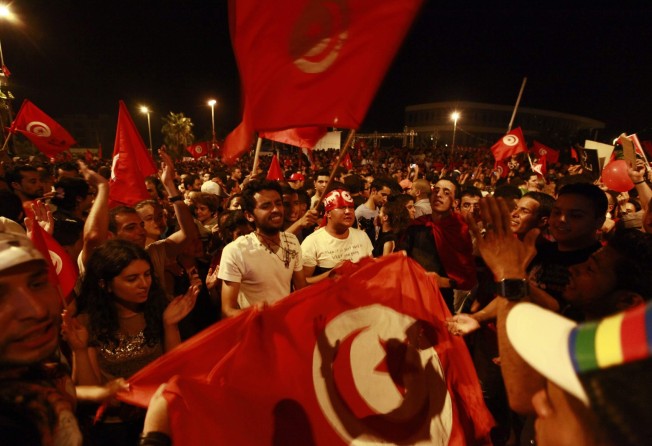Tens of thousands march against government in Tunisia

Tens of thousands of people poured onto the streets of the Tunisian capital to demand the resignation of the government as the political crisis in the north African nation deepened.
The country has been wracked by political unrest since the July 25 murder of opposition lawmaker Mohamed Brahmi and Tuesday’s protests marked the biggest anti-government demonstration since the assassination.
A police official estimated that 40,000 people crowded the streets of Tunis to call for the government led by the moderate Islamic movement Ennahda to step down. Opposition leaders cited in local media put the figure at 100,000-200,000.
Earlier on Tuesday, the National Constituent Assembly (ANC) - a body elected in 2011 to forge consensus on drafting a new constitution -- was suspended.
Brahmi’s murder, as well as that of another opposition politician, Chokri Belaid, have been blamed on radical Islamists, with the Ennahda-led cabinet criticised for not doing enough to prevent them.
The demonstration attracted a mixed bag of opposition parties, ranging from extreme left to centre-right, and was timed to mark six months since Belaid was gunned down outside his home.
Protesters carried pictures of both Belaid and Brahmi and shouted slogans such as “The people want the regime to fall” and “The government will end today”.
The march passed off peacefully.
Assembly speaker Mustapha Ben Jaafar said the ANC’s work would be halted until the government and opposition opened negotiations to break the deadlock “in the service of Tunisia”.
Brahmi’s killing had already prompted several opposition members to boycott the ANC and its suspension was a key demand of the protesters on the street.
The stalemate showed no sign of ending, however, with the opposition refusing to hold talks with the government until it steps down and Ennahda ruling out any dialogue conditional on its ouster.
Larayedh has refused to quit, offering instead to broaden the coalition.
Ben Jaafar criticised the country’s politicians for failing to find a compromise as Tunisia also battles mounting terror threats.
“Despite the gravity of the situation and instead of working towards unity, unfortunately party leaders have gone in the opposite direction, towards division, by mobilising” street protests, he said.
Since the ANC was elected in October 2011, political leaders have failed to find a consensus on a new constitution following a revolution that ousted longtime president Zine el Abidine Ben Ali.
And the suspension of the assembly’s work throws into question Prime Minister Ali Larayedh’s target of the ANC adopting a new constitution and electoral law by October 23 ahead of a December 17 election.
Ennahda chief Rached Ghannouchi, quoted in La Presse newspaper on Tuesday, said the government will not step down under pressure from the street, while Larayedh charged that demonstrators were hampering efforts by security forces to root out gunmen linked to Al-Qaeda.
“There are excessive demands at protests for the dissolution of the elected government,” Ghannouchi told La Presse.
“In democratic regimes, protests don’t change governments. It’s under dictatorial regimes that a demonstration is able to topple a regime.”
Earlier Tuesday, before its work was suspended, the ANC had gathered to discuss the “terrorist crisis” as security forces pressed on with a vast operation to hunt down militants holed up in the rugged Mount Chaambi region near the Algerian border.
Speaking to the assembly, Larayedh had harsh words for the demonstrators, saying their activities meant security forces “are obliged to be in the streets when they should be participating in the battle against terrorism”.
Defence Minister Rachid Sabbagh told the ANC that the armies of Tunisia and Algeria would “reinforce their cooperation, particularly to arrest the Chaambi terrorists.”.
“We will continue our operations until all the terrorists have been killed or arrested,” said the minister.
Ghannouchi also dismissed the criticism that authorities are being soft on radical Islamists, who have grown in influence since the popular uprising that toppled Ben Ali two years ago.
“There are 500 to 600 terrorist suspects imprisoned in jails,” he noted.